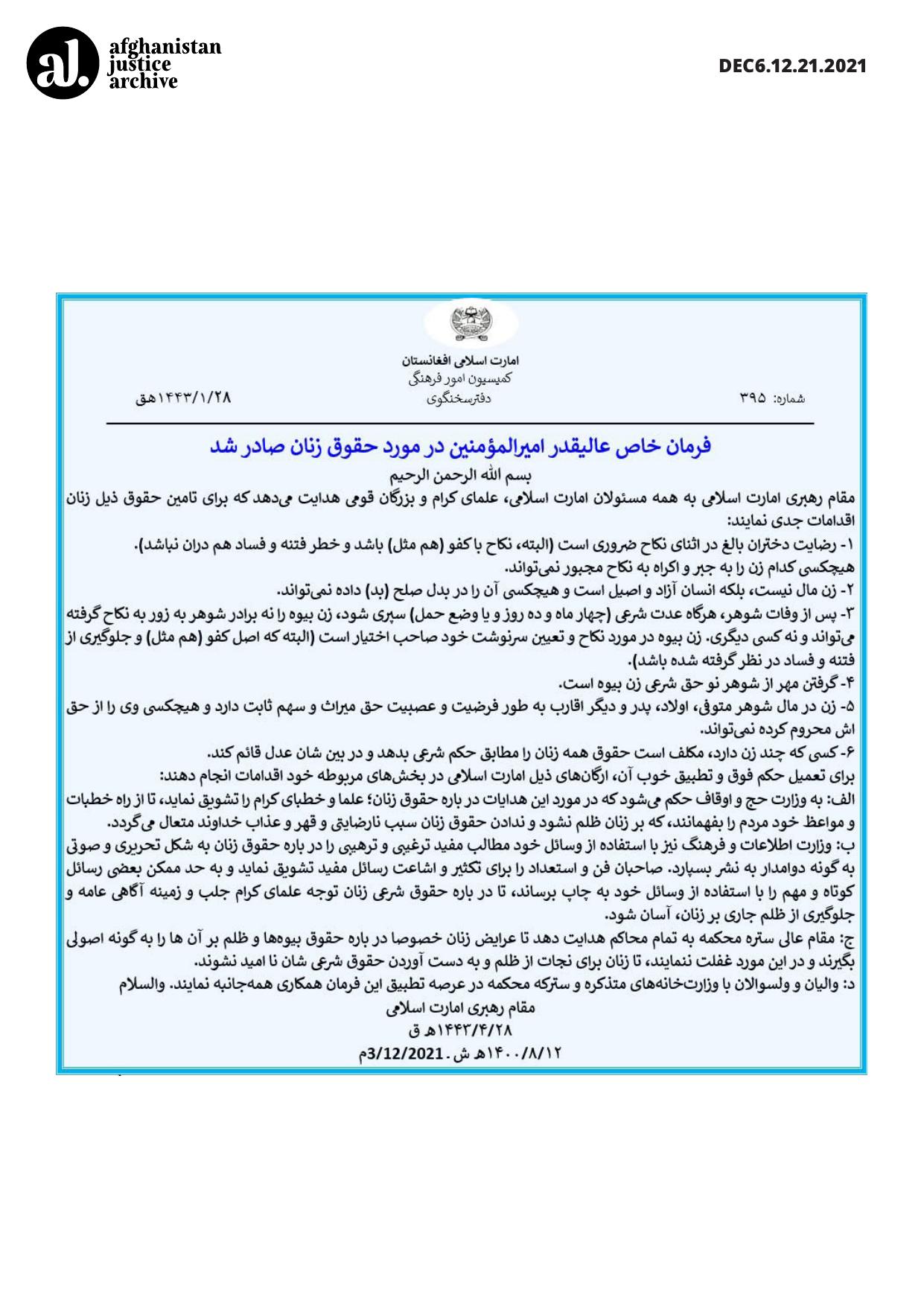Decree
Decree Translation
Date: 28/4/1443
Special decree of the Supreme Leader of the Islamic Emirate regarding women's rights was issued:
In the name of Allah, Most Gracious, Most Merciful
1- Consent of Adult Women in Marriage
The consent of adult women is essential for marriage (provided the marriage is with a suitable match and there is no risk of discord or corruption).
No one has the right to force a woman into marriage through coercion or pressure.
2- Women Are Not Property
A woman is not a commodity; she is a free and dignified human being. No one may offer her in exchange for reconciliation (e.g., as compensation in tribal disputes).
3- Rights of Widows After Husband’s Death
After the death of her husband and the completion of the prescribed waiting period (four months and ten days, or until childbirth), a widow cannot be forced into marriage by her brother-in-law or anyone else.
She has full autonomy in deciding her future and marriage (again, considering suitability and avoidance of discord).
4- Right to Dowry in Remarriage
A widow is religiously entitled to receive a dowry from her new husband upon remarriage.
5- Inheritance Rights of Women
A woman has a fixed and legitimate share in the inheritance of her deceased husband, children, father, and other relatives, as prescribed by Islamic law.
No one has the right to deprive her of this inheritance.
6- Justice Among Multiple Wives
A man with multiple wives is religiously obligated to uphold the rights of all his wives equally and to maintain justice among them.
Implementation Instructions for Relevant Departments of the Islamic Emirate
A. Ministry of Hajj and Religious Affairs
Shall encourage scholars and preachers to educate the public through sermons and religious guidance on women’s rights, emphasizing that denying women their rights is an act of injustice and invites the displeasure and punishment of Almighty God.
B. Ministry of Information and Culture
Shall continuously publish informative and motivational content—both written and audio—on women’s rights.
It should encourage experts and creatives to produce and disseminate useful materials and, where possible, print concise and important messages using its resources to raise awareness among scholars and the general public, and to help prevent ongoing injustices against women.
C. Supreme Court
Shall instruct all courts to properly address women’s petitions, especially those concerning widows’ rights and injustices against them, and to ensure no negligence occurs.
This is to ensure women do not lose hope in seeking justice and securing their religious rights.
D. Provincial Governors and District Officials
Shall fully cooperate with the aforementioned ministries and the Supreme Court in implementing this directive.
Issued by the Leadership of the Islamic Emirate
Date: 28 Rabi' al-Thani 1443 AH / 12 Aqrab 1400 SH / December 3, 2021 CE
This decree is presented as an affirmation of women’s rights under Islamic law—focusing on marriage, inheritance, widowhood, and dignity. On its face, it appears to advocate for key protections such as the right to consent in marriage, protection from being treated as property, and access to inheritance. However, it fails to address essential rights such as education, employment, political participation, and personal freedoms. It frames women primarily in domestic and reproductive roles, reinforcing a patriarchal system that treats women as dependents rather than equal citizens. Despite its presentation as a step forward, the decree reflects a vision of women’s rights that.
Without meaningful enforcement, oversight, or repeal of contradictory policies, the decree risks functioning more as a symbolic or rhetorical gesture rather than a substantive change in governance. Its selective focus on family law, while excluding civil liberties and public rights, reflects a narrow and conditional interpretation of women's rights—filtered through patriarchal and theological frameworks. This decree should be monitored not just for content but for implementation, especially in court rulings, provincial governance, and sermons, where much of the real power over women’s lives is exercised. is deeply limited and rooted in male control.
